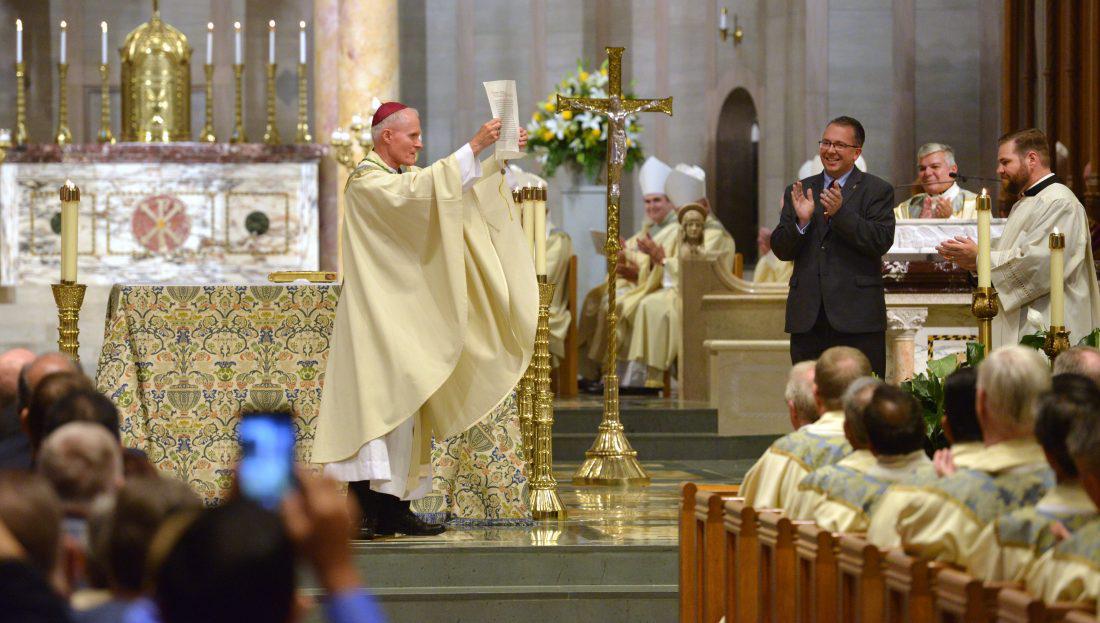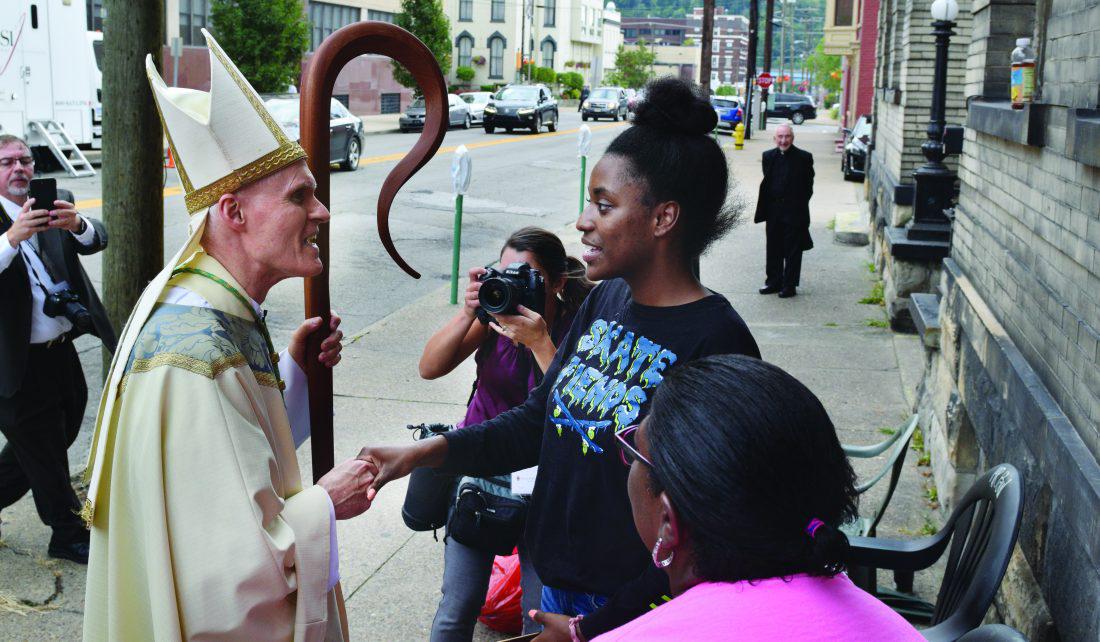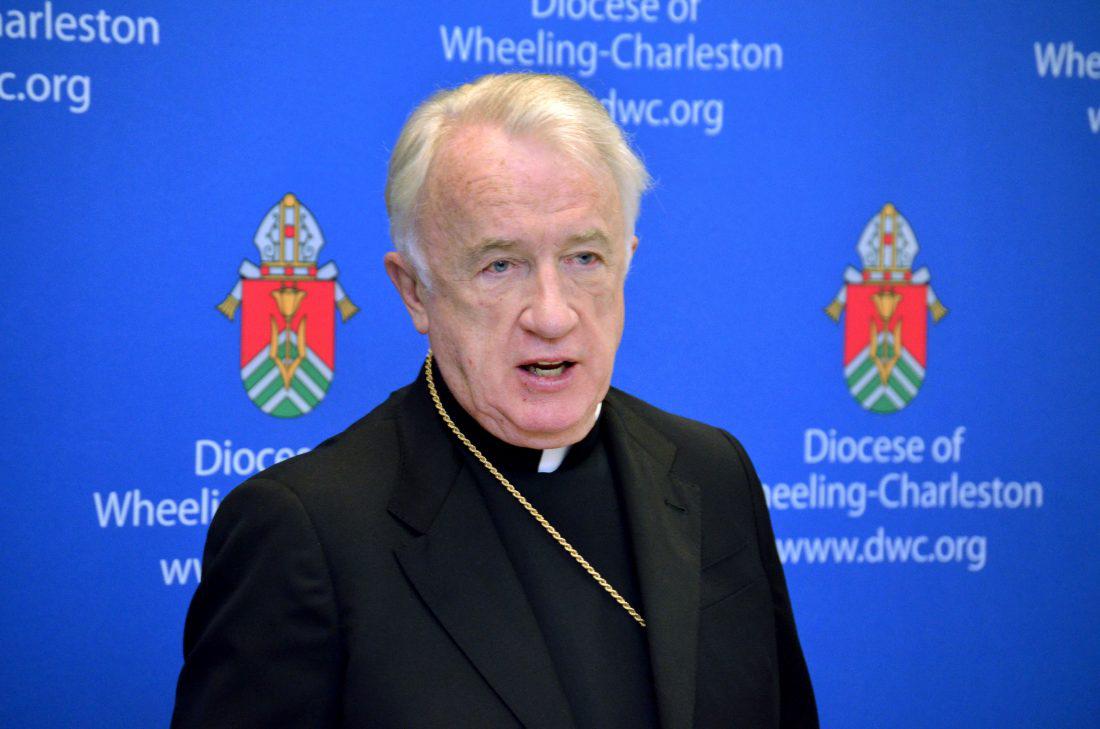|
‘Sunday Sit-Down’ With The Most Rev. Mark Brennan, Bishop of the Diocese of Wheeling-Charleston
The Intelligencer - Wheeling News Register
Editor’s note: The Most Rev. Mark Brennan, ninth bishop of the Diocese of Wheeling-Charleston, has been busy visiting with schools, parishes and everyday people in Wheeling since his installation late last month –a marked change from his predecessor. Brennan comes in at a pivotal time for the diocese, as the actions and spending by the former bishop, Michael Bransfield, remain an open wound. Brennan has been tasked with healing that wound, and he discusses that and more as he joins us in the Sunday Sit-Down. ∫ What are your initial thoughts on the state of Catholicism in West Virginia? BRENNAN: I really have to get to know the people and places. … My initial impressions are that there are a lot of really good people who have suffered and yet have kept their faith, have kept doing the things I mentioned in my homily on Thursday, that parents kept training their children in the faith, in good Christian living, teachers have kept showing up each day in the Catholic schools, religious education programs have continued in the parishes, Catholic Charities workers are helping people afflicted with opioids or whatever else they needed. The perseverance in their faith — I think recognizing that the turbulence above doesn’t mean that the base of their faith is cracking open. Upset about what went on, what was revealed, that’s understandable. I feel the same way. But my initial impression is good people who hopefully can work with me to go forward and offer the kind of witness to Christ that we’re supposed to be offering here in this state. ∫ As part of the Archdiocese of Baltimore, which is the larger regional organization that oversee the Diocese of Wheeling-Charleston, what were your thoughts over the past year as events in West Virginia unfolded? BRENNAN: I was shocked to learn about this. … A lot of things (in the report) — the amounts of money that were spent on personal indulgences. … That was shocking, I didn’t know a bishop would do that. I’ve never seen a bishop do that. Harassing younger priests or seminarians, abusing them in that way that was done. I was a vocation director for 10 years in Washington, my happiest day was when a man left the seminary program by being an ordained priest. Harassing those younger priests? Gosh, why would you do that? I don’t understand. I was shocked, and I can understand how people would be very upset and angry that that went on, and misusing their money. People want priests. One of the good things I found going around the Baltimore Archdiocese was that in this past year — so we had the revelation about Cardinal McCarrick, and then the Pennsylvania report, Bishop Bransfield — the people are not angry at their priests. There was somewhat of a different story back in 2002 with the Boston Globe revelations about the clergy sexual abuse of children. This time — if they’re going to be angry at the bishops, better than than at their parish priests. I hope that’s true here, too, in West Virginia. ∫ Following your installation, you went outside of The Cathedral here in Wheeling and met with members of the public. What did you learn from that? BRENNAN: The friendliness of the people — some were from here, some were friends, some I’ve known for a long time. The Chancellor, Chad Carter, suggested I go across the street and meet the people who live in a couple of the apartment buildings across the street. … I walked over and met with them, they were a little flustered, I think, because I came in my episcopal regalia. I met Yvette, Sophia, and a couple kids, it was nice to meet them. I stopped (last) Sunday afternoon to talk with them again. I just enjoy being with the people. ∫ You come to West Virginia at a time when the Diocese finds itself at the center of several major storylines – none of them positive. First, of course, is the scandal surrounding the former bishop, Michael Bransfield. Second is a federal lawsuit against Wheeling Hospital alleging violations of the Stark Act and the Anti-Kickback Statute. There’s the situation at Wheeling University. Financial concerns at the diocese. The release last fall of priests credibly accused of sexual abuse. A lawsuit from the attorney general of West Virginia. With all this, how do you plan to convince people who have left the church to return? BRENNAN: Well ultimately the question is do they want to follow Christ. They might say well, I can do it at another church, and I’m not saying that they couldn’t, but are they going to walk walk away and stay away from their brothers and sisters in the faith. Are they going to stay away from the mass — our Catholic faith is that Christ always makes himself truly present in the Eucharist. Evangelical churches don’t do that. A devotion to Mary and the Saints — the Lord wants us to honor his mother and great followers of the past. These are things that are particular to the Catholic faith … why walk away from that. Help us be part of the solution rather than just sitting on the sidelines. Play in the game. I quoted a man in my Homily last Thursday who had left (the church) for a while, but he came back because he realized he wasn’t helping anybody by staying away, and was only hurting and depriving himself of fellowship with his fellow Catholics, Eucharist, confession. I hope people will see it as we try to address, with the help of the people who give me counsel here, the various issues. We’re trying to make headway here and do things the right way, without self-indulgence and bad behavior that they’ve experienced in the past. ∫ As the new bishop, you’ve been tasked with ensuring Michael Bransfield “makes amends for the damage he has done” to the diocese and the faithful in West Virginia. Let’s start with this: Have you read the report commissioned by Archbishop Lori into Bransfield’s time in West Virginia? BRENNAN: I have seen it, I don’t have a written copy. I’ve read the Washington Post articles, which quoted a lot of it, so I have some familiarity. As I had said the day of my announcement when the same question was asked … what I’m responsible for is the making of amends for the damage the former bishop caused. I said then .. and I will repeat here. Consultation, prayer, reflection and decision. I’ve already consulted with a group of priests called the College of Consultors, senior priests of the diocese. I’ve already consulted with the finance council of the diocese. I’ve already met with a few of the people who were directly abused by the former bishop. So, a good bit of the consultation I have done already. In thinking about things, praying about it … in the Catholic understanding, the making of amends is not to give someone a death sentence. I’m not going to cut off someone’s head, or put a noose around their neck and hang them. It’s really to restore justice, and right relationships. And to give the former bishop the opportunity to respond, in a positive way, to … the express will of the Holy Father that he make amends for the damage he’s done. I’ll be working on a plan for him to do that. My hope is he will be cooperative, recognize this as an opportunity to show that he does regret things that he had done, and he’s willing, within his power, to make up for it. If he cooperates, good. If he doesn’t, there are still things we can unilaterally do to impose some kind of amends. … It’s just like in a confession, a kid comes in and says “I stole my classmate’s candybar.” Well, make restitution, buy your classmate a candy bar. Or “I gossiped about somebody.” Try to repair the damage you caused by that gossip. Tell people what I said was wrong, I shouldn’t have said that. In that line, restore justice as far as you can. I’m looking at it that way. ∫ Are you surprised Bransfield has remained somewhat defiant? BRENNAN: I understand he’s denied the allegations. What I would say on that is there are multiple accusations and witnesses of abuse. And there are financial records that we have. And we’re working to separate what is clearly diocesan expense and justifiable, shall we say, and other things which clearly were not. If they’re clearly not, you ought to make amends. The evidence, I think, is there. ∫ Have you ever dealt with the making amends process with another priest? BRENNAN: Priests? No, I don’t recall anything like that. I’ve known some priests who had certainly misused parish funds or abused people, but I haven’t directly had to deal with them. ∫ Will you advocate for the full public release of the Bransfield report? BRENNAN: It is a report that was requested by the Holy See from the apostolic adminstrator, from Archbishop Lori, so it really is their report. I would be in consultation with the Holy See through the Papal Nuncio, the ambassador of the Holy See to the United States, about that matter. Again, the Washington Post has put out some of (the report). It would be interesting to see what the reaction would be if all of it were out there. … Some people might conclude differently based on other things said in the report. There could be some value just from that score of doing it, but again, it’s an internal report given to the highest authority of the church. Do I have a right to put that out on my own? I don’t think I do, but I can talk to the folks about the possibility of doing that. ∫ Wheeling University — just a few weeks ago, the Diocese gave a $2 million gift to the university to ensure it’s short-term viability and allow its reauthorization as leaders there search for a path forward. Under your leadership, is the Diocese of Wheeling-Charleston financially committed to ensuring the long-term viability of Wheeling University? BRENNAN: To be very honest, I am still very much in the dark about that whole matter. If you think of a circle that’s 100% dark, maybe 5-6% percent of that is light, is what I understand of it. There’s an awful lot more darkness there that I’ve got to get greater clarity on. I would say, in general, institutions should be able to achieve a certain amount of viability. My parish school at my last parish — it went through some difficult times, and the parish backed it up financially, substantially. Then it went through better times and was more sustainable and still is, on its own. But that’s the point you want to try to get to. It does seem to me, in the end, the people of this area have to value that school and make use of it. … Short term, I have no problem with giving them that money to help them make it through the year. Long term, we’ve got to look at what are the prospects for viability? I do hear they have very good medical field-related programs, and it would seem to me with this big hospital here, and people in need, medical services adds a value to the community. ∫ Let’s shift to Wheeling Hospital. The hospital is owned by the Diocese, and finds itself in the middle of a federal lawsuit. What have you learned so far about the lawsuit? BRENNAN: … It was a revelation to me that there are federal laws (that govern what hospitals can pay doctors.) I was not aware of that. I’m presuming there are good reasons. … Beyond that, did (the hospital), in fact, do that. Are there mitigating circumstances. I’m not familiar with what the hospital is arguing, or what the nature of the charges are beyond the general sense that they were paying people more than they should have according to federal law. ∫ Let me ask you another Wheeling Hospital question: WVU Medicine is here now, managing the hospital. There has been a lot of talk that, when the lawsuit is dealt with, there may be an agreement to sell the hospital to WVU, or to another partner. What are your thoughts? BRENNAN: Since I am the sole owner of Wheeling Hospital — I mean, I don’t want to think about that, it’s scary — I want to see how the relationship (between WVU Medicine and Wheeling Hospital) develops. … Down the road, what might be a reasonable accommodation? They have a whole system throughout the state. It’s interesting — the University of Maryland has a hospital system, as well. Part of that system is St. Josephs Hospital in Towson, Maryland. That was my region. I read very carefully through the entire agreement between the university system and the Archdiocese of Baltimore. And it was protective of the Catholic identity of St. Josephs Hospital. I interviewed applicants for the position of vice president for mission integration, which essentially was the chief chaplain, head of pastoral care. That agreement so far, in practice, has worked out OK. If, in fact — social trends, what way are they going to go, our society is in such flux, we’re so divided, polarized — what way is this going to sift out in the end? If this goes in a more secular direction, and say the University of Maryland hospital system says you must perform abortions, we can’t do that. We’re not going to do that. The only option we would have in that situation would be to pull out of the agreement and try to run the hospital on our own. … Again, I’ve got to get a lot more clarity on these issues. ∫ What are one or two things that West Virginians would be surprised to learn about Mark Brennan? BRENNAN: From 3rd grade through high school, I took piano lessons, and actually became a reasonably good amateur pianist. I noticed there’s a piano there in the first floor of the Chancery building in Wheeling, but I haven’t played in a number of years. It’s a nice way to relax. Pope Benedict XVI, pope emeritus now, plays piano, and still does. That’s something they might not know. Also, I was once the pastor of the Korean Catholic Parish of the Archdiocese of Washington. … Great people. … In varying degrees, I speak English, Spanish, French and Italian. A few words in Korean, not much. That was an interesting experience, to be with the Korean people. ∫ We spoke earlier about former bishop Bransfield’s spending, his lifestyle. What’s Mark Brennan’s lifestyle? BRENNAN: I pay my own bills, as far as I can. I did (cook my own meals) in Baltimore, I’m not much of a cook. … At different places I’ve lived I’ve done my own laundry, my own cleaning, in Baltimore I bought my own groceries and prepared my own meals as much as I needed to. ∫ We’ve heard you drive an extravagant luxury car. What’s the make and model? BRENNAN: A Ford Taurus? Which now needs a new water pump (Brennan’s vehicle broke down on his way to Wheeling recently)? I was west of Pittsburgh on I-79, the light goes on, “engine coolant overheating.” This is not good. So I pull off the exit, find a place to park … and let it cool down, pour in antifreeze, it was almost dry. … I said “Lord, you know I’ve got to get to Wheeling.” And I started it up, no lights were on, drove here. Did I do more damage? Probably did, but I did get here. … I like the car, it’s only got 77,000 miles on it, a 2016. I want to push that to 200,000 miles. ∫ The former bishop lived in a beautiful home here in Wheeling that’s recently been sold. Where will you live during your tenure with the diocese? BRENNAN: The Cathedral rectory is about 50 yards from the entrance to my office. Having lived 31/2 miles from my office in Baltimore, having at my last parish cross six lane divided highway … this is kind of nice to be able to walk out the door, turn the corner and within about 30 seconds get to the entrance to my office. This is a beautiful, 100-year-old Victorian-style building, built to be a bishop’s residence. Big rooms, high ceilings. It’s very nice. I have a sitting room, a bedroom, and a bathroom. That’s enough. I think I’ll just stay there at this point. ∫ Outside of your official duties, what are you hobbies? BRENNAN: I enjoy reading. … (One of the books) I’m reading now is by a professor of Biology at Brown University, where I went, he was a year behind me, Kenneth Miller — on “Finding Darwin’s God,” he wrote about 20 years ago. I went for my 50th college reunion over Memorial Day weekend, he was at the Mass I celebrated. ∫ Any final thoughts for the Catholics of West Virginia? BRENNAN: I’m glad to be here. I’m going to root for West Virginia University up here, and Marshall in the south, unless they play one another, in which I’ll take a discreet silence.
|
.
Any original material on these pages is copyright © BishopAccountability.org 2004. Reproduce freely with attribution.


